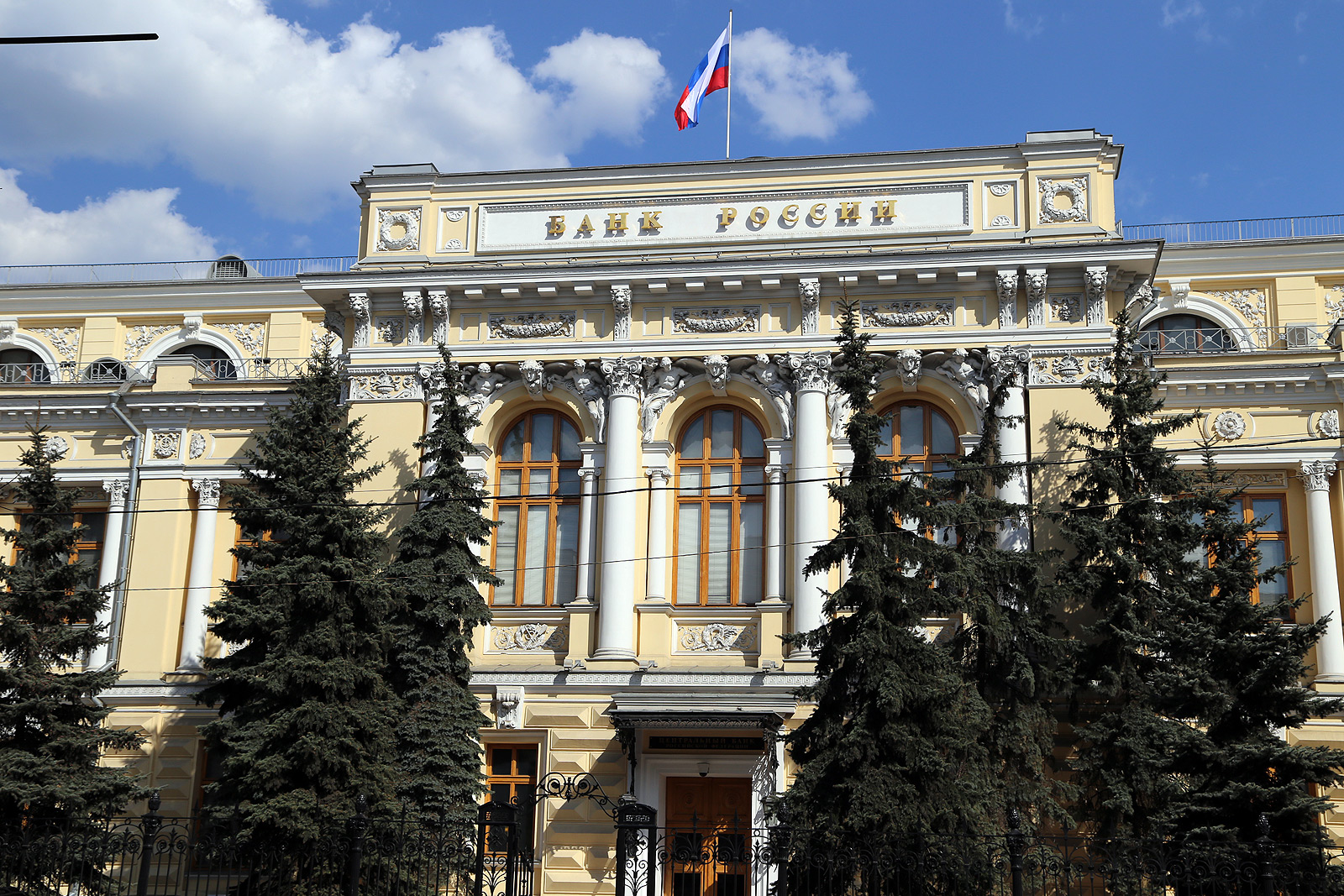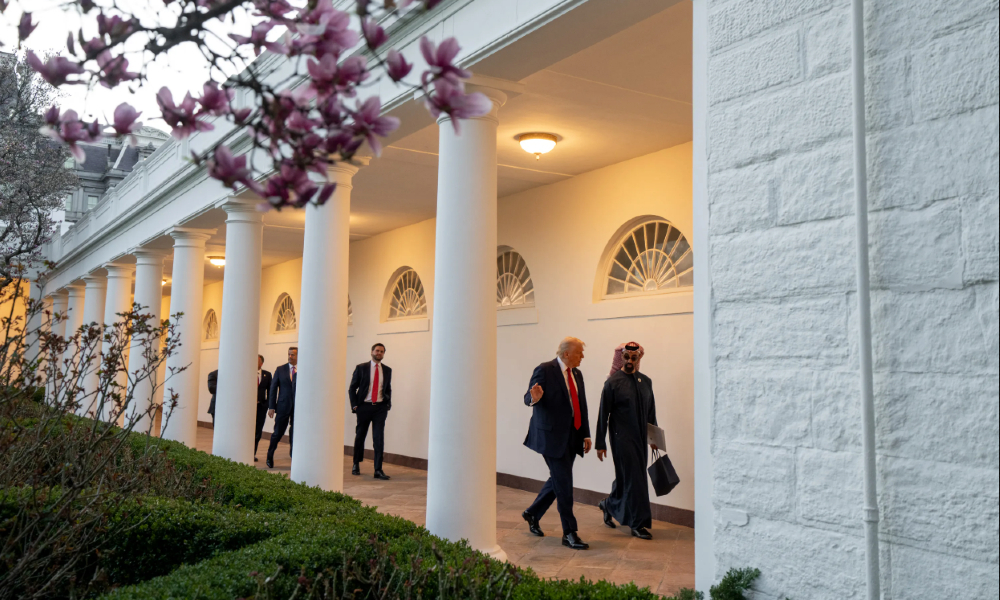Giving Russian Assets to Ukraine—Freezing Is Not Seizing
What the executive branch should not do is pretend that Russia’s money can be used to provide material support to Ukraine in the face of existing legal barriers.

Published by The Lawfare Institute
in Cooperation With

Pundits have reveled in the prospect of using the Russian central bank funds currently frozen by the U.S. Department of Treasury to make reparations to Ukraine for war crimes and other injuries inflicted by Russia’s devastating and outlaw invasion. How delicious it would be to enforce international law against such an obviously culpable perpetrator, all done by the United States without any outside help! A recent New York Times op-ed by Harvard Law emeritus professor Laurence Tribe and younger colleague Jeremy Lewin blow by potential legal obstacles at warp speed. My colleague Philip Zelikow, a history professor at the University of Virginia and counselor to Secretary of State Condoleezza Rice, and Simon Johnson, a distinguished international economist and MIT professor, repeat the same error, although they have some interesting things to say about what rebuilding Ukraine would entail. All four insist that President Biden already has the authority to transfer the frozen Russian assets to Ukraine and would face no constitutional impediments in doing so.
Some commentators have noted that the idea is too good to be true, given the present state of U.S. law. I agree with those who argue that Tribe, Lewin, Zelikow and Johnson get current law wrong. Just as importantly, I have grave reservations, based on constitutional and international law, about proposals to enact new legislation to bring about their preferred outcome.
The International Economic Emergency Powers Act and Implied Presidential Authority
The International Economic Emergency Powers Act (IEEPA), adopted in 1977, clearly empowers the president to freeze foreign-owned assets, including the property of foreign states. A freeze destroys the current economic value of assets by criminalizing any attempt to transact with them or derive any benefits from them. What a freeze does not do, however, is change ownership. As Andrew Boyle, an international lawyer, Lee Buchheit, a longtime Cleary Gottleib partner, and Mitu Gulati, my colleague at the University of Virginia School of Law, all have observed, IEEPA has a narrow exception, codified at 50 U.S.C. § 1702(1)(C), authorizing the president, “when the United States is engaged in armed hostilities or has been attacked by a foreign country or foreign nationals[,]” to confiscate foreign-owned property and to dispose of it as he sees fit. As Boyle observes, Congress adopted IEEPA with the goal of trimming the authorities that presidents had had since World War I, including a broad confiscation power. The 2001 Patriot Act later added this narrowly confined confiscation authority. But this exception does not apply to Russia, which has not “attacked” the United States as a matter of international law and with which the United States is not engaged in armed hostilities. So, IEEPA does not permit what Tribe, Lewin, Zelikow and Johnson propose.
Perhaps, though, the president has implied powers under the Constitution to confiscate foreign assets even outside of war? The Supreme Court in Zivotofsky v. Kerry, a 2014 decision, held that the president’s power under Article II of the Constitution to “receive Ambassadors and other public Ministers” embraces an exclusive authority to recognize foreign states and their governments and to make other choices that flow from this power. Thus Congress’s attempt to compel the State Department to treat Jerusalem as the capital of Israel, contrary to the policy of every president from Truman to Obama, failed (although Trump later reversed course on his own executive branch nickel).
Tribe and Lewin reference two examples from recent history to support their claim, the latter of which Zelikow and Johnson also cite. Invoking the recognition power, the Trump administration announced that it would put frozen Venezuelan assets at the disposal of the government he recognized, that of Juan Guaidó. This year the Biden administration expressed an intention to make frozen Afghan state assets available to a government yet to be recognized, but not the Taliban. These precedents, cited by Tribe, Lewin, Zelikow, and Johnson as proof of the validity of their proposal, thus rely on a narrow ground irrelevant to Russia’s property. Where this principle does not apply, only the IEEPA’s narrow exception, inapplicable to Russia, permits the president to do more than freeze sovereign assets. (As Vanderbilt law professor Ingrid Wuerth has pointed out, a separate proposal by the administration to allow U.S. terrorism judgment creditors to these assets rests on a problematic interpretation of the Terrorism Risk Insurance Act, also inapplicable to Russia.)
Are there other constitutionally implied presidential powers? In the 1981 decision Dames & Moore v. Regan, the Supreme Court held that the president had the capacity, in the absence of either authorization or objection from Congress, to agree with Iran to transfer some of its frozen assets to an international claims tribunal for disposition by that tribunal according to the terms of the agreement. For the court, it mattered that presidents had entered into these kinds of international agreements since the dawn of the republic without ever encountering congressional pushback. The case, in other words, was not about exclusive executive power that, as in Zivotofsky, Congress may not override or limit.
Were President Biden to recognize a new government of Russia, perhaps one led by Aleksey Navalny, and then give him the right to dispose of the frozen assets, Zivotofsky might apply. But he hasn’t, and therefore it doesn’t. Accordingly, the Venezuelan and Afghan cases cited by Tribe and Lewin and, in the case of Afghanistan, Zelikow and Johnson do not stand for what they claim. If the administration wants to go down this path, it must, as Boyle concludes, go to Congress for permission to do so.
Constitutional Issues With Hypothetical New Legislation
To authorize the transfer of the frozen Russian assets to Ukraine, Congress would have to amend not only the IEEPA but also the Foreign Sovereign Immunities Act (FSIA). The latter, a 1976 statute that provides immunity from judicial process, provides unlimited protection to the assets of foreign central banks parked in the United States. The reason for that immunity should be obvious: U.S. banks, in particular the Federal Reserve Bank of New York, want to hold these deposits, and can attract them if the depositors enjoy legal protection from their confiscation.
Tribe and Lewin argue that the FSIA poses no problem for their proposal, as it applies only to judicial process and they envision unilateral executive action without going to court. Wuerth has explained on this website why the FSIA has nothing to do with freeze orders, which do not rely on direct judicial enforcement and subject actors to criminal and other sanctions (which are subject to judicial review) only if they violate the order. This is obviously correct. But, as Wuerth observes, confiscation presents a different problem. Tribe and Lewin envision a world where the president can seize and dispose of foreign sovereign property at will, without any judicial review. They seem to overlook the possibility that foreign sovereigns might sue to contest the seizure. When bringing a suit, they necessarily would have to waive their immunity from U.S. judicial process. These suits, however, would allow them to bring both administrative law and constitutional claims that a U.S. court could address.
Perhaps Congress, in the course of authorizing the president to confiscate foreign-owned property outside of wartime, also might bar foreign sovereigns from access to U.S. courts. No one has suggested this yet, but I see no other way around judicial involvement in the proposed confiscations. Here difficulties arise. As a matter of constitutional law, the government’s taking of property may proceed only on the basis of due process of law. Even if Congress were to characterize the confiscation of Russian assets as a penal forfeiture rather than a “taking,” the subject of the forfeiture still has a right under the Due Process Clause of the Constitution to obtain judicial review.
Such rights do not exist here, Tribe and Lewin explain, because the Constitution provides no protection to the property of foreign states. This proposition is not crazy, as the Supreme Court in a 1992 case, Republic of Argentina v. Weltover, Inc., stated that because the government measure in question had satisfied due process, it had no need to decide whether the Constitution compelled this. Two courts of appeals have drawn an inference from this diffidence that due process does not apply. The American Law Institute’s 2018 Restatement (Fourth) of the Foreign Relations Law of the United States, for which I served as a coordinating reporter, treated the question as still open and noted that many courts apply due process principles nevertheless. Wuerth, who contributed to that project, focusing mostly on sovereign immunity issues, has argued cogently and persuasively in the Fordham Law Review that the property of foreign sovereigns located in the United States does enjoy constitutional protection, notwithstanding the interjections of the Second Circuit and the District of Columbia Circuit to the contrary. To treat the matter as closed, as do Tribe and Lewin, dodges an important and very much open question.
I agree with Wuerth that, in appropriate cases, the Supreme Court is likely to hold that the recognized government of a foreign state with which the United States is not in an armed conflict is constitutionally entitled to some sort of judicial review when the U.S. government seizes its property for disposal at the discretion of the president. That the U.S. courts are generally open to foreign governments under these circumstances is one of the core holdings of the leading case, Banco Nacional de Cuba v. Sabbatino. The court in a 1978 statutory case, Pfizer, Inc. v. Government of India, had no trouble regarding a foreign state as a “person” for purposes of obtaining the protection of U.S. law. To be sure, the court there only interpreted an ambiguous if critically important statute (the antitrust laws), rather than throw out a clear congressional choice on constitutional grounds. But the point generalizes. The U.S. Constitution protects anyone who brings themselves or their property within the United States’ borders. That protection at least extends to not leaving those people and that property at the mercy of the whims of the government. This means ensuring some kind of judicial review of the legality of the government action. The Pfizer case rested on an important principle: Just because a foreign state has different rights and powers than a private person does not mean that it cannot enjoy the benefits of the rule of law within the United States.
Congress could frame a law targeting frozen Russian assets narrowly enough that the due process entitlement would be of little practical value. My point, however, remains the same: Constitutional due process still should apply to the property of foreign states, if only to ensure that the executive acts within the clear limits that Congress sets out. U.S. commentators should not want the government to acquire a taste for lawlessness, however disgusting its target might be.
International Legal Issues With Possible New Legislation
Even were Congress to adopt a law that authorized the confiscation of Russian property with sufficient art to overcome all serious constitutional objections, international law would still pose some issues. I think it well established that, if Congress and the executive embrace with sufficient clarity and purpose a constitutionally sound law that breaches the United States’ international legal obligations, U.S. courts must regard that law as valid. But this practice is not a good idea, even if domestic law enables it.
I think it clear that the assets of a sovereign central bank enjoy some kind of international legal immunity from confiscation, as opposed to freezing, by the state in which they are found. This immunity does not depend on the presence or absence of judicial process and thus is independent of the kind of sovereign immunity that Tribe and Lewin talk about. Granted, the scope of this immunity is unclear, largely because, outside of armed conflicts, states are not in the habit of doing this. Accordingly, there have been few if any disputes to provide precedents. But the absence of seizures during times of peace itself speaks loudly.
The International Court of Justice (ICJ) currently has a suit that raises this issue, involving U.S. legislation that diverts the frozen assets of Iran’s central bank to specified U.S. judgment creditors. ICJ cases sometimes go off the rails for procedural reasons, but it is at least possible that the court will find that the United States violated Iran’s rights under international law. If Congress takes the same approach to Russia’s assets as it did to Iran’s, it likely will manifestly violate international law.
Tribe and Lewin do not mention international law at all. Zelikow and Johnson do, although not altogether convincingly. They argue that confiscating Russia’s state property would not present any international law problems because Russia itself is in clear violation of international law. It follows, they argue, that states may take countermeasures, including seizing the frozen property. Their argument is not ridiculous, but their article does not surface its problems.
First, however manifest may be Russia’s violation of the U.N. Charter through its armed invasion of Ukraine, an authoritative and conclusive determination by an impartial body has not yet been made. The U.N. General Assembly’s resolution is important but has no legal force. The finding of the ICJ in its ruling on provisional measures in Ukraine’s suit under the Genocide Convention, made in a proceeding in which Russia did not participate, may not qualify, given its preliminary nature.
Perhaps that doesn’t matter, given the evident lawlessness of Russia’s actions and the implausibility of its claim that its inherent right to self-defense excuses its actions. But, second and more significantly, the law of countermeasures is not as clear-cut as Zelikow and Johnson make it out to be. It imposes procedural and substantive requirements, which, depending on how it is implemented, their proposal may not satisfy. It simply is not true that even grave violations of international law permit the rest of the world to retaliate with any measure that otherwise would violate international law. The same court in 1980 indicated that the U.S. effort to rescue the U.S. Embassy staff held hostage by Iran, arguably a countermeasure to a gross violation of international law, itself was “calculated to undermine respect for the judicial process in international relations” and possibly may have violated international law. At a minimum, I cannot agree that there exists a slam-dunk argument for the legality of the contemplated action under international law.
One might respond that, if Congress can erect an impenetrable barrier against enforcement of international law in the United States, and if U.S. allies share the conviction that Russia has become an outlaw because of its reprehensible behavior, why should the U.S. worry about what international law says? U.S. disregard of ICJ judgments in other areas, such as the validity of waivers of the right to consular notification by people arrested on capital charges, is a matter of record. Surely neither domestic courts nor those of the Western world will bring the U.S. to account.
I have two replies to this response. First, in the case of unlawful seizure of state property for well-intentioned purposes, the chance of an unwanted reckoning always exists. Russia will not always be a pariah. When it returns to the fold, it will want its money back. Almost certainly the United States will comply with the request for repayment, which means that U.S. taxpayers will have to foot the tab for the money that went to Ukraine.
Perhaps this is a good result, if Ukraine really is the most worthy recipient of U.S. largesse. But doing this without a deliberate decision by Congress or the executive seems somewhat fishy. The U.S. track record of using Cuban and Iranian assets to pay off the holders of default judgments for human rights claims follows this pattern, with U.S. taxpayers inevitably destined to pay the compensation bill, not the perpetrators of the outrages. I fear the same outcome for Russian atrocities against Ukraine.
Second, U.S. policymakers should not be comfortable about flouting international law, even if the law produces a result they find repugnant. Since the end of the Cold War, U.S. foreign policy has presented the international rule of law as one of the linchpins of the global society that the U.S. wants to build. Granted, the United States’ principal adversaries, China and Russia, have a different conception as to what the international rule of law means. But a transparent violation of a category of rules that the U.S. normally supports, simply because compliance would frustrate an immediate sense of justice, undermines the ability to use international law to shape a more peaceful and prosperous world, for those in the United States as well as the other residents of this planet.
* * *
I appreciate the impulse to hoist Russia on its own petard. The invasion is an outrage, and the atrocities that have come to light disgust any sensible person. One can hope for a resolution that will both stop the killing and destruction while vindicating basic values and a sense of justice. In the meantime, the U.S. should provide Ukraine what aid it can, based on current authorities or new ones adopted by Congress. What the executive branch should not do is pretend that Russia’s money can be used to provide material support to Ukraine in the face of existing legal barriers.
Confiscating the frozen central bank assets is not something to be done lightly, if at all. In arguing that the executive already has the authority to do this and that Russia’s property in any event enjoys no legal protection in the United States, Tribe, Lewin, Zelikow and Johnson play to the passions of the American public, not its judgment. Grave and consequential matters of constitutional and international law are at stake. U.S. policymakers should not ignore these considerations just because doing so would make the American people, however briefly, feel good.





